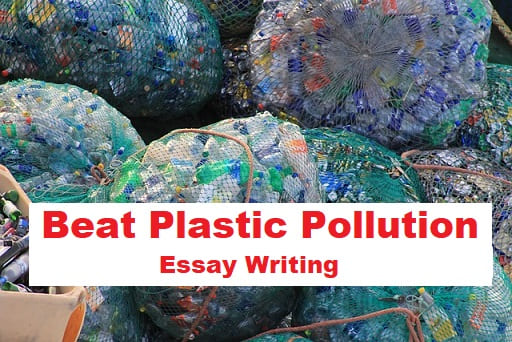Plastic Pollution has been growing rapidly with he growing population. This causes an alarm to prevent plastic pollution to make earth a cleaner, healthier and happiest place to live in.

Essay on Beat Plastic Pollution
Plastic pollution has emerged as one of the most pressing environmental challenges of our time. The widespread use of plastic products, coupled with improper disposal practices, has led to devastating consequences for our ecosystems and human health. In response to this global crisis, the campaign to “Beat Plastic Pollution” aims to raise awareness, promote sustainable alternatives, and encourage individuals, communities, and governments to take action. Lets explore and highlight important headings to address this critical problem and pave the way towards a more sustainable future by beating plastic pollution.
Rise of Plastic: Convenience and Consequences
This section examines the rise of plastic as a widely used material due to its convenience, durability, and cost-effectiveness. However, it also sheds light on the negative consequences of plastic production and consumption, such as excessive waste generation, resource depletion, energy consumption, and the persistence of plastic in the environment.
Understanding Plastic Pollution: A Global Menace
This heading explores the scale and impact of plastic pollution on our ecosystems and human well-being. It discusses the alarming statistics surrounding plastic waste, including the staggering amount of plastic entering our oceans, rivers, and landfills. It emphasizes the detrimental effects on marine life, the food chain, and the overall health of our planet.
Plastic’s Toll on Marine Life: A Cry for Help
This section highlights the devastating impact of plastic pollution on marine life. It discusses the entanglement and ingestion of marine animals, leading to injuries, suffocation, and death. It also addresses the role of microplastics, which accumulate in the bodies of marine organisms and find their way into the human food chain, posing risks to human health.
Plastic’s Environmental Footprint: Beyond the Ocean
This heading expands the discussion beyond marine pollution and examines the broader environmental footprint of plastic. It explores the impact of plastic waste on terrestrial ecosystems, including soil contamination, disruption of natural habitats, and adverse effects on wildlife. It also delves into the carbon emissions and energy consumption associated with plastic production and disposal, contributing to climate change.
The Need for Collective Action: Governments and Policies
This section emphasizes the crucial role of governments and policies in addressing plastic pollution. It highlights the importance of implementing comprehensive waste management strategies, promoting recycling infrastructure, imposing bans on single-use plastics, and encouraging the adoption of sustainable alternatives. It also discusses international agreements and initiatives aimed at curbing plastic pollution, emphasizing the need for global cooperation.
Individual Responsibility: Empowering Change
Under this heading, the focus shifts to individual responsibility and the power of collective action. It highlights the choices individuals can make to reduce plastic consumption, such as carrying reusable bags, bottles, and utensils, opting for products with minimal packaging, and supporting businesses that prioritize sustainability. It also discusses the importance of raising awareness, educating communities, and advocating for change at a grassroots level.
Innovations and Sustainable Alternatives: Paving the Way to Beat Plastic Pollution
This section showcases innovations and sustainable alternatives that can help combat plastic pollution. It explores biodegradable and compostable materials, the use of recycled plastics, and the promotion of circular economy models that minimize waste generation and maximize resource efficiency. It also emphasizes the role of research and development in finding innovative solutions to plastic pollution.
It is imperative that governments, industries, communities, and individuals unite in the fight against plastic pollution. Governments must enforce stringent regulations and invest in waste management infrastructure. Industries should prioritize sustainable production and packaging practices, seeking alternatives to single-use plastics. Communities can organize clean-up initiatives, promote recycling programs, and educate their members about the importance of reducing plastic waste. Individually, we can make a difference by adopting eco-friendly habits, advocating for change, and inspiring others to join the cause.
Beat Plastic Pollution Campaign as a reminder
The “Beat Plastic Pollution” campaign serves as a reminder that we all have a responsibility to protect our planet and future generations. Let us take a stand against plastic pollution and embrace sustainable practices that preserve our environment. Together, we can create a cleaner, longer a threat. By reducing our reliance on plastic, embracing reusable alternatives, and supporting sustainable initiatives, we can collectively beat plastic pollution.
Furthermore, ongoing research and technological advancements play a vital role in finding innovative solutions to tackle plastic pollution. Scientists and inventors are exploring biodegradable materials, developing efficient recycling methods, and pioneering new ways to repurpose plastic waste. These efforts, coupled with the collaboration of governments, industries, and individuals, offer hope for a future where plastic pollution is effectively addressed.
Conclusion
Plastic pollution poses a grave threat to our planet’s ecosystems and human well-being. However, by acknowledging the urgency of the issue, understanding its consequences, and taking collective action, we can beat plastic pollution. Through the adoption of sustainable alternatives, the implementation of effective policies, and the empowerment of individuals, we can pave the way towards a future free from the shackles of plastic pollution. Let us embrace the challenge, make conscious choices, and forge a path towards a cleaner, healthier planet. By working together, we can create a world where plastic pollution is a thing of the past.
